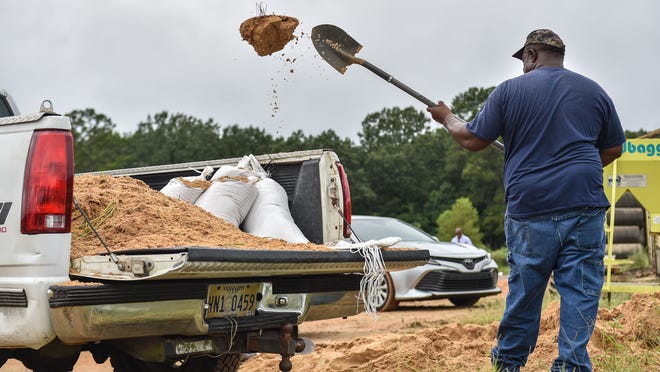JACKSON, Miss. – The streets of Jackson will begin to drain Monday after days of heavy rain caused the Pearl River to crest just below the major flood stage.
Experts predict the river will remain at a high of just over 35 feet — nearly a foot less than what was anticipated over the weekend — and then slowly subside Monday night.
National Weather Service meteorologist Marty Pope said officials cut back the discharge into the Pearl River from the Ross Barnett Reservoir by 10,000 cubic feet per second this morning. Pope said this will allow the streets in north Jackson to start draining and most areas will be drained by Monday morning.
Jackson and central Mississippi have experienced heavy rainfall throughout August. In preparation for the flooding, Mississippi Gov. Tate Reeves declared a state of emergency for Jackson and other nearby areas, some Jackson Public Schools shifted to virtual learning and the Mississippi Emergency Management Agency deployed 126,000 sandbags to act as water barriers.
City officials initially estimated between 100 and 150 homes could be impacted by the floodwaters, as disaster relief groups traveled to Jackson to deliver gift cards and family necessity kits to victims of the flooding. Jackson Mayor Chokwe Lumumba urged residents to evacuate and expressed concern that damage in his city could rival the destruction seen in February 2020, when floodwaters damaged more than 500 homes.
Gov. Reeves declared another state of emergency Monday night declaring Jackson’s ongoing water crisis an immediate health threat.
The city’s water treatment plant has been operating well below capacity, officials said, which could result in no water pressure for most of the city in the coming days.
Dr. Daniel Edney, state health officer, said water testing conducted by the Mississippi State Health Department over the past month has determined the water currently provided by the city is unsafe.
“The water is not safe to drink or even brush your teeth with,” Edney said, adding that any use of tap water for cooking or consumption “needs to be fully boiled.”
Steve McCraney, Executive Director of MEMA, said the bottled water will initially be provided at the city’s fire stations, with an expansion to other sites anticipated later.
Non-potable water, unsuitable for drinking but adequate for flushing toilets and some other uses will also be made available, he said. “We have 38,000 bottles in storage and additional 18-wheelers on the way,” McCraney added.
Up to 4,500 National Guardsmen will be assisting MEMA with the water distribution efforts, McCraney confirmed.
Pope said so far no homes have flooded, citing officials with the Hinds County Emergency Management Agency.
“The water was just about to enter some homes, but the Pearl River Valley Water District allowing the reservoir to rise within a foot and a half of its max really helped to keep the water from rising higher,” Pope said.
Reservoir manager John Sigman said even as the water recedes, it could take up to a week for everything to get back to normal.
Contributing: Ed Inman, Mississippi Clarion Ledger; The Associated Press
Contact Breaking News Reporter N’dea Yancey-Bragg at nyanceybra@gannett.com or follow her on Twitter @NdeaYanceyBragg


